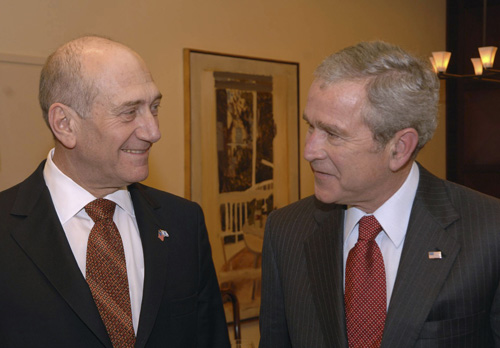Bush asks Mideast to move for democracy

George W. Bush, left, holds up a falcon as the Crown Prince of Abu Dhabi Sheik Mohammed bin Zayed Al Nahyan, right, watches during a visit to the Royal Stables at the Al Asayl Racing and Equestrian Club, Sunday. Amos Ben Gershom, The Associated Press
January 14, 2008
ABU DHABI, United Arab Emirates – President Bush gently nudged authoritarian Arab allies Sunday to satisfy frustrated desires for democracy in the Mideast and saved his harshest criticism for Iran, branding it “the world’s leading state-sponsor of terror.”
Speaking in this Persian Gulf country, about 150 miles from the shores of Iran, Bush said Tehran threatens nations everywhere and that the United States was “rallying friends around the world to confront this danger before it is too late.”
The warning about Iran was much tougher than Bush’s admonition about spreading democracy in the Middle East, which had been billed as the central theme of his speech.
In a region of autocratic rulers, Bush did not single out any country for criticism. He spoke about democracy in a deeply undemocratic country, the United Arab Emirates, where an elite of royal rulers makes virtually all the decisions. Large numbers of foreign resident workers have few legal or human rights, including no right to protest working conditions.
“To the people of the Middle East: We hear your cries for justice,” Bush said. “We share your desire for a free and prosperous future. And as you struggle to find your voice and make your way in this world, the United States will stand with you.”
Get The Daily Illini in your inbox!
Usually averse to sightseeing, Bush rode out into the sand dunes to the desert encampment of Abu Dhabi’s crown prince, Sheik Mohammed Bin Zayed Al Nahyan. Later, Bush returned to his suite in the opulent Emirates Palace Hotel, constructed at a cost of more than $3 billion and reputed to be the most expensive hotel ever built.
The next stop scheduled on Bush’s eight-day Mideast journey was Saudi Arabia. Its ruler, King Abdullah, has tried to push some reforms on education and women’s rights, and there have been limited municipal council elections.
But he has been cautious and limited in his efforts, apparently hampered by others in the royal family worried that fast changes could upset the country’s conservative clerics and citizens.
In Egypt, the last country Bush planned to visit, the democracy effort has stalled badly. The opposition candidate, Ayman Nour, who ran against longtime President Hosni Mubarak in the first multiparty elections, remains jailed on what many critics view as trumped-up criminal fraud charges.
Apparently referring to Egypt, Bush said, “Unfortunately, amid some steps forward in this region we’ve also seen some setbacks. You cannot build trust when you hold an election where opposition candidates find themselves harassed or in prison.”
Bush cast the broader campaign for democracy in terms of the battle against terrorism, saying there was a desire for freedom from terrorism, oppression and injustice. “We see this desire in the ordinary people across the Middle East, who are sick of violence, who are sick of corruption, sick of empty promises – and who choose a free future whenever they are given a chance.”
Bush praised some democratic reforms in Arab countries. He urged leaders to show support for the fragile Iraqi government, open their societies and provide backing, and possible money, to help make an Israeli-Palestinian agreement stick.
“Leaders on both sides still have many tough decisions ahead, and they will need to back these decisions with real commitments,” Bush said. “But the time has come for a holy land where Palestinians and Israelis live together in peace.”
Bush’s blistering words about Iran appeared intended to reassure Arab allies about U.S. readiness to confront Tehran.
There have been doubts about Washington’s intentions because of a new U.S. intelligence report that said Iran had stopped pursuing nuclear weapons in 2003.
Associated Press writer Sally Buzbee contributed to this report






